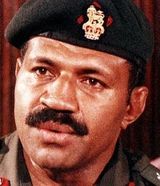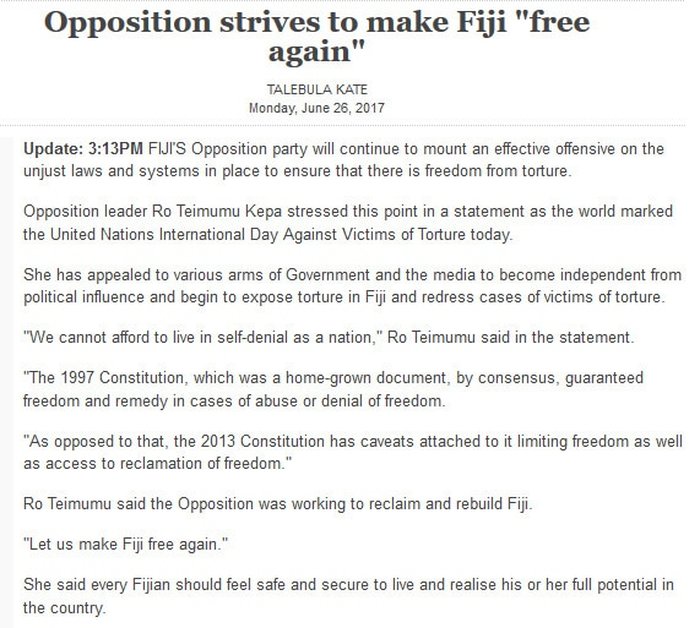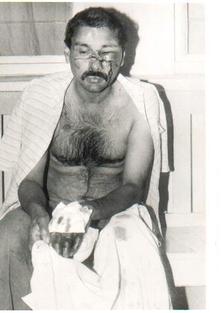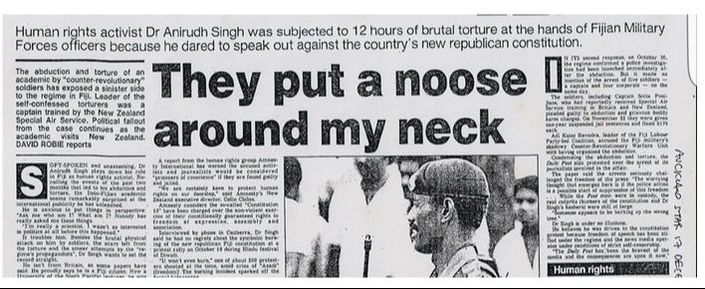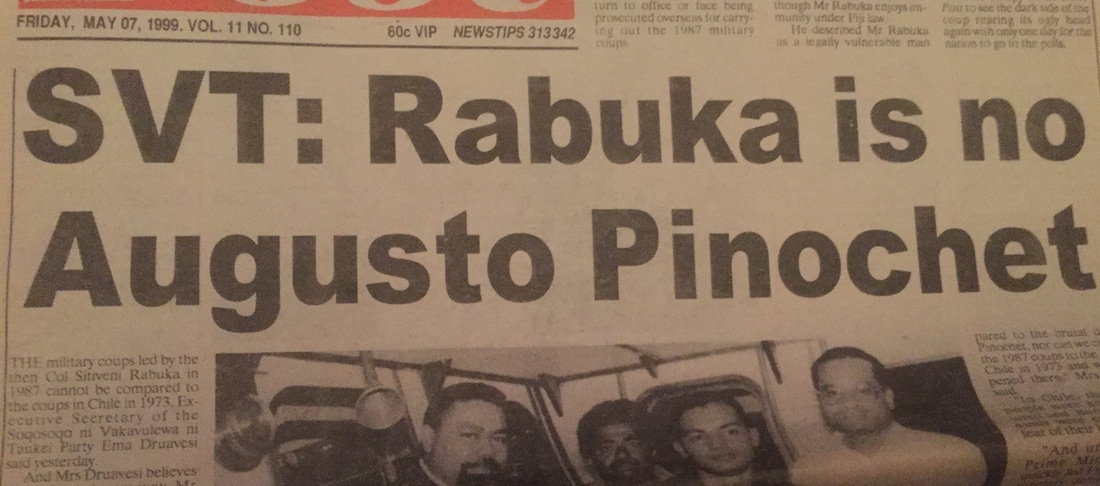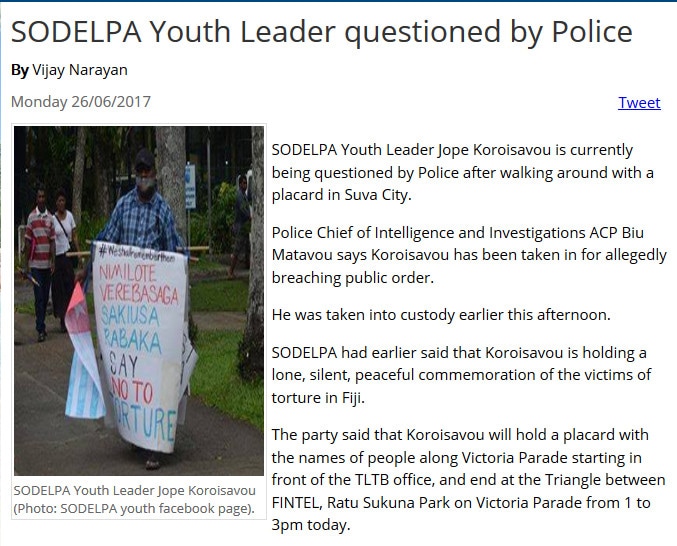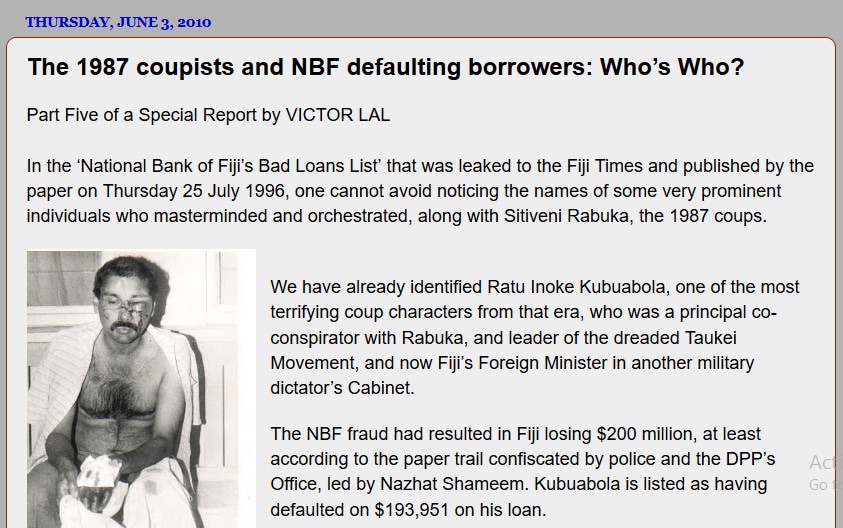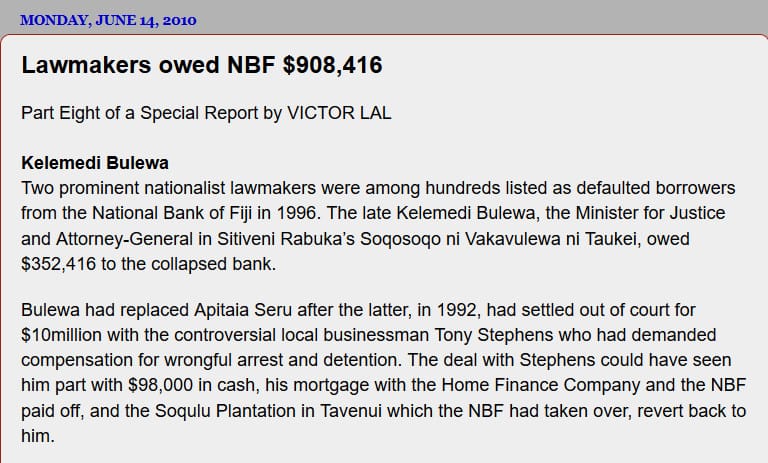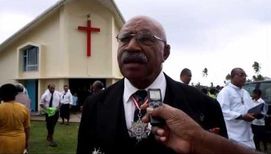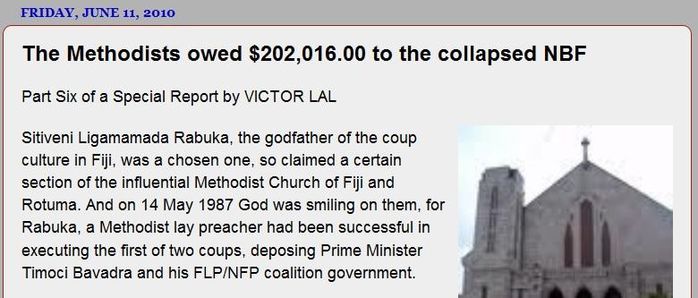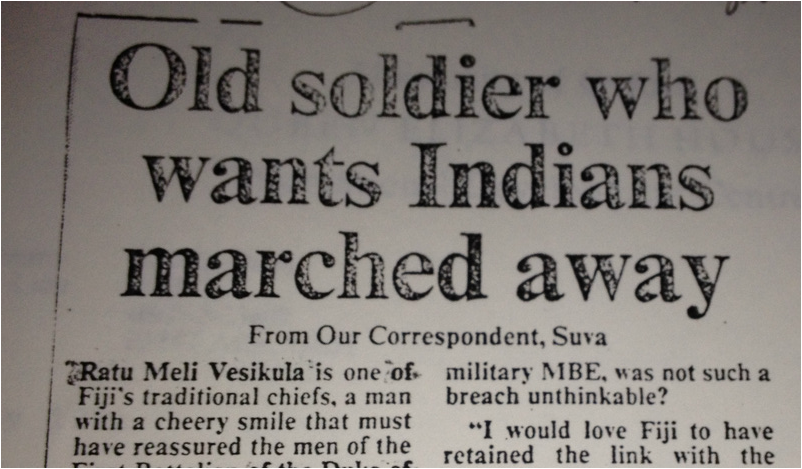AND the IMMUNITY he granted himself in the 1990 Constitution, carried forward in 1997 and 2013 Constitutions, is shielding him from charges of TREASON
In his book, Rabuka: No Other Way, by two journalists, Stan Ritova and Eddie Dean, Rabuka claims that it was at Rakivi’s home that he first learnt of the Taueki group’s plan for massive ‘demonstrations and the possibility of widespread arson and possibly murder’.
According to Ritova and Dean Rabuka (his words in italics) went to, ‘…what he understood was an ordinary ‘grog’ party at the Rev. Rakivi’s home, in suburban Suva. It was early evening, and he just walked in, as he normally would, throwing his ‘sevusevu’ [gift] of yagona towards the bowl where the ‘grog’ was being mixed. ‘I saw all these people sitting down, and realised it was some kind of a meeting. Some of the people greeted me, although I could not see everyone clearly, because it was fairly dark in the lounge room. Nobody asked me to leave.’
When his eyes adjusted to the darkness, he discovered the gathering was ‘quite a formidable group’. He says it included Ratu Finau Mara, the son of Ratu Sir Kamisese Mara; Ratu George Kadavulevu, son of the Paramount of Chief of Fiji, Ratu George Cakobau; Ratu Inoke Kubuabola; Ratu Keni Viuyasawa, the brother of Brigadier Nailatikau; Mr Filipe Bole, formerly a Minister in the Mara government; Ratu Jo Ritova, of Labasa; Ratu Jale Ratu; ‘Big Dan’ Veitata and the host Tomasi Rakivi…Another leading light at this meeting was Apisai Tora.’
Taniela Veitata
We may recall that when Sitiveni Rabuka and a group of 10 masked soldiers, cowardly hiding behind balaclavas and gas masks, took over Parliament and captured Dr Timoci Bavadra and his Government team on the morning of 14 May 1987, it was Veitata who was making his maiden speech as Opposition MP: ‘Peace is quite distinct, Mr Speaker, from the political philosophy of Mao Zedong where he said that political power comes out of the barrel of a gun. In Fiji, there is no gun…’
What he did not inform the House, the country, and the world was that he, Kubuabola, Bole and others had been plotting that coup moment in secrecy, waiting for Rabuka and his team to finish the job.
During that secret meeting at Raikivi’s house in Suva, according to Ritova and Dean, those allegedly God-fearing men, some of chiefly rank, exchanged opinions, and turned to God for help: ‘The link with God and Christianity surfaced here, too. At the end of the meeting, which was full of fire and brimstone talk about what to do with the Coalition and the ‘flawed’ [1970] Constitution, which had allowed the election of an Indian-dominated Government, they joined hands and prayed to God. Their prayer, in summary, was simple: ‘Save us, and save our land. You saved the Israelites when their land was taken away from them by foreigners. Dear God, please answer our prayer and do the same for us.’
There is no evidence that they also prayed to God to open up the National Bank of Fiji to them but it was not long afterwards that their ‘God’s Messenger on Earth’, in the form of Sitiveni Rabuka, decreed that the NBF grant “soft loans” to the “downtrodden” taukei population.
Among them who made a run to the NBF was none other than Taniela Veitata, for he is listed among the doubtful debtors, to the tune of $25,323.
It seems Reverend Raikivi had forgotten, or chose not to read out to him Psalms 37: 21:
‘The wicked borroweth and payeth not’.
Apisai Tora
As soon as Bavadra and his government were sworn in, the Taukei Movement, led by Tora and prominent Alliance personalities sprang up. Tora said the group had been formed to mobilize the Fijian people and give them a more unified voice on national affairs in their own country. He then announced a campaign of civil disobedience, and called for the 1970 Constitution to be changed so far to guarantee Fijian chiefly leadership in government permanently.
At meetings and demonstrations he charged that the Bavadra government was a front for Indo-Fijian interests and that their immediate objective was to rob Fijians of ownership and control of their land. Such words suggest that he was a revolutionary Fijian hero, but Tora was simply a turncoat. Since he crossed to Ratu Mara’s Alliance Party before the 1982 general election, he had acquired Ratu Mara’s respect and confidence and had finally become a Cabinet Minister. Previously, however, he was with the National Federation Party; in 1968 he had provided the prefix ‘National; to the Federation Party to form the NFP.
As we know, Tora went on to play a major role in the downfall of the Bavadra government. Equally, when the NBF fell into the deep financial hole, Tora was listed, along with Veitata and others, to have defaulted his loan to the tune of $194,393.
Ratu Meli Vesikula
He was one of the foremost Taukei leaders. Vesikula who, as a former NCO in the Duke of Wellington’s Regiment in the British Army, had seen action in Northern Ireland, Cyprus and Malaysia, said that in the light of his experience Rabuka’s military solution was the only option in then ethnic crisis.
But when Rabuka appointed Ratu Penaia Ganilau as President and Ratu Mara as Prime Minister after the second coup in September 1987, Vesikula led a breakaway Taukei faction, saying: ‘It’s more and more the Alliance team back in place. This is the old system being rammed down our throats again in a roundabout way – the backdoor. I would like the indigenous Fijian people to stand united and say, No, enough is enough’.
He went on to claim: ‘I see no chance at all of my two ratus here changing their outlook and their life and the running of the country in general…The Great Council of Chiefs had clearly stated that it will nominate the President, and the Prime Minister would be elected by secret ballot after the general elections. I’m sorry to say this but I feel Rabuka handed power back to a dictator on five December.’
In 1988, a group of army officers, in collusion with the splinter Taukei Movement entertained the possibility of seizing power from Mara and Ganilau, with Vesikula remarking: ‘Now that power has been given to the Tovata group, what is there to stop chiefs from other areas to go to the military camp and order their people to lay down their arms and join them.’
To Vesikula’s credit, he publicly admitted his mistakes when he came into spiritual contact with the international Moral Re-Armament Group (Initiative for Change). He confessed he was responsible for many acts of violence perpetrated against the Indo-Fijians after the 1987 coups: ‘But in 1988, the truth began to dawn on me that the coups were just part of a political power play by people who had lost their power at the ballot box in 1987.
In 1990 he publicly apologised to the Indo-Fijians at an MRA conference in Suva.
However, in 1996, he was revealed, along with other 1987 coupists of owing to the NBF $8,000 loans that had been set aside to help ‘poor Fijians’.
Savenaca Draunidalo
He was Rabuka’s second-in-command on that fateful day on 14 May 1987 when Dr Timoci Bavadra was overthrown as Prime Minister of the FLP-NFP coalition government. Worse, he was the ex-husband of Adi Kuini Teimumu Vuikaba Bavadra, who herself had fought for reform of the chiefly system by insisting on standards of accountability for all chiefs.
Like others in the Rabuka camp, Draunidalo was also listed on the NBF’s Debtors List in 1996; he was shown as owing to the bank $156,605.
Sotia Ponijiasi
He was the army captain who, along with five members of the RFMF, had abducted and tortured Dr Anirudh Singh, a lecturer in physics at the University of South Pacific in Fiji. Singh was abducted from his home on 24 October 1990, bundled into a car and driven off to secluded woodland outside Suva. He had bandages taped over his eyes and a hood tied down tight over his head. He was repeatedly beaten and interrogated about his fellow protestors, and about his contacts in Australia and London.
They also retrieved a list of names and phone numbers that he always kept with him for ready reference (incidentally on that list of contacts was my own name, and soon afterwards I myself began to receive credible death threats for my opposition to the Rabuka coups).
At one point Singh’s hands were smashed against a root with a metal pipe and they also forcibly cut his hair and burnt him with cigarettes. But before they left him for dead, one of his captors lit a match and began burning the already-cut hair at the tips, some kind of pagan ceremony of humiliation. The whole ordeal lasted for eleven hours. Singh was finally set free, and had lived to tell his tale in his book Silent Warriors.
Singh’s crime was that he had led a group of demonstrators who publicly burned the overtly racist 1990 Constitution, which Ganilau and Mara said was needed ‘for the protection and enhancement of Fijian and Rotuman interests’. In reality, as I will be revealing one of these days, it was to enhance the Mara/Ganilau clan’s business interests with the likes of Ponijiasi following in their footsteps.
In the NBF’s Debtors List of 1996, Ponijiasi is listed as owning to the bank $29,763.01.
So much for Rabuka’s much vaunted Holy Grail of affirmative action – to help the poor and economically disadvantaged taukei in Fiji.
Another Ponijiasi – Mere - owed $26,354.36.
In all, Rabuka’s 1987 above coupists owed a combined total of $415,000 to the collapsed National Bank of Fiji, reward for supporting the 1987 Rabuka coups.
C4/5 Editor’s Note: We will continue to reveal debtors names, which includes those of high chiefs, politicians, Indo-Fijians, business houses, including individual supporters of the present illegal junta in Fiji.
Picture: Dr Anirudh Singh, who was tortured by Sotia Ponijiasi and five members of the RFMF.
